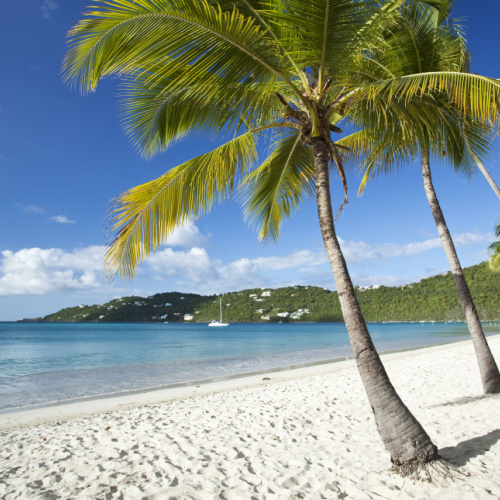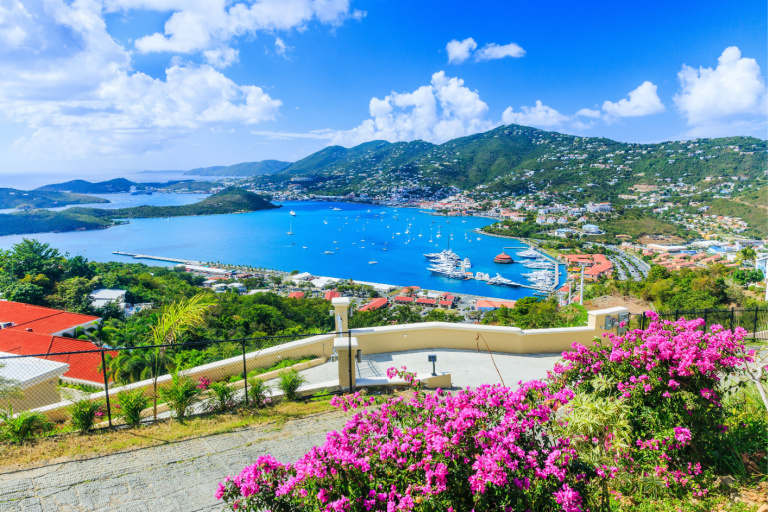
Sasha Buzko/Shutterstock
When Is the Best Time to Visit The Virgin Islands?
The best time to visit the Virgin Islands is during the dry season, which runs from December to May. During these months, the weather is sunny and warm, with less rainfall, making it ideal for exploring the islands’ many attractions.
Here are some of the benefits of visiting the Virgin Islands during the dry season:
- Mild weather: The weather in the Virgin Islands during the dry season is generally mild and pleasant, with average temperatures ranging from 75 to 85 degrees Fahrenheit. This means you can enjoy the islands’ beaches, crystal-clear waters, and lush rainforests without being too hot or too cold.
- Sunny skies: The dry season in the Virgin Islands is known for its sunny skies, with little rainfall. This means you can enjoy the islands’ stunning scenery without having to worry about getting wet.
- Less rainfall: With less rainfall during the dry season, you can be sure that your travel plans won’t be disrupted by bad weather.
Here are some specific examples of how to enjoy the most of the Virgin Islands during the dry season:
- December to February: The weather in December, January, and February is typically warm and sunny, with occasional showers. This is a great time to visit for swimming and sunbathing at the beaches of Magens Bay and Coki Beach, exploring Coral World Ocean Park, and visiting the Blackbeard’s Castle ruins.
- March to May: The weather in March and May is also typically warm and sunny, with occasional showers. This is a great time to visit for sailing in the Charlotte Amalie Harbor, hiking in the Virgin Islands National Park, and attending the St. Thomas Carnival.
While there are many great times to visit the Virgin Islands, if you’re looking for the best weather and the most opportunities to enjoy the islands’ many attractions, then we recommend visiting during the dry season, from December to May.
Note: It is important to be aware that the hurricane season in the Virgin Islands runs from June to November. During the hurricane season, there is a higher chance of experiencing hurricanes and tropical storms.
 Average Temperatures by Month
Average Temperatures by Month
|
Jan |
Feb |
Mar |
Apr |
May |
Jun |
Jul |
Aug |
Sep |
Oct |
Nov |
Dec |
| Fahrenheit |
83°
|
83°
|
83°
|
84°
|
85°
|
86°
|
87°
|
87°
|
87°
|
86°
|
85°
|
84°
|
| Celsius |
28°
|
28°
|
28°
|
29°
|
29°
|
30°
|
31°
|
31°
|
31°
|
30°
|
29°
|
29°
|
Climate in The Virgin Islands
Summer Season in The Virgin Islands
The Virgin Islands' summer season, from June to August, offers warm and tropical weather, with temperatures ranging from 82°F to 90°F. It's an ideal time for beach vacations, water sports, and exploring the stunning sandy beaches and crystal-clear waters. The warm and humid weather is perfect for outdoor activities and enjoying the local culture and cuisine.
Rainy Season in The Virgin Islands
The Virgin Islands experience some rainfall throughout the year, but there isn't a distinct rainy season. Showers can occur, but they are typically short-lived and don't significantly affect travel plans.
Winter Season in The Virgin Islands
The Virgin Islands' winter season, from December to April, provides milder and more comfortable temperatures, ranging from 75°F to 85°F. This is the prime time for beach vacations, outdoor adventures, and exploring the islands' historical sites. The dry and cooler weather is ideal for enjoying the natural beauty and cultural traditions of the islands.
Our Recommendations
| Destination |
Jan |
Feb |
Mar |
Apr |
May |
Jun |
Jul |
Aug |
Sep |
Oct |
Nov |
Dec |
| The Virgin Islands |
 |
 |
 |
 |
 |
 |
 |
 |
 |
 |
 |
 |






